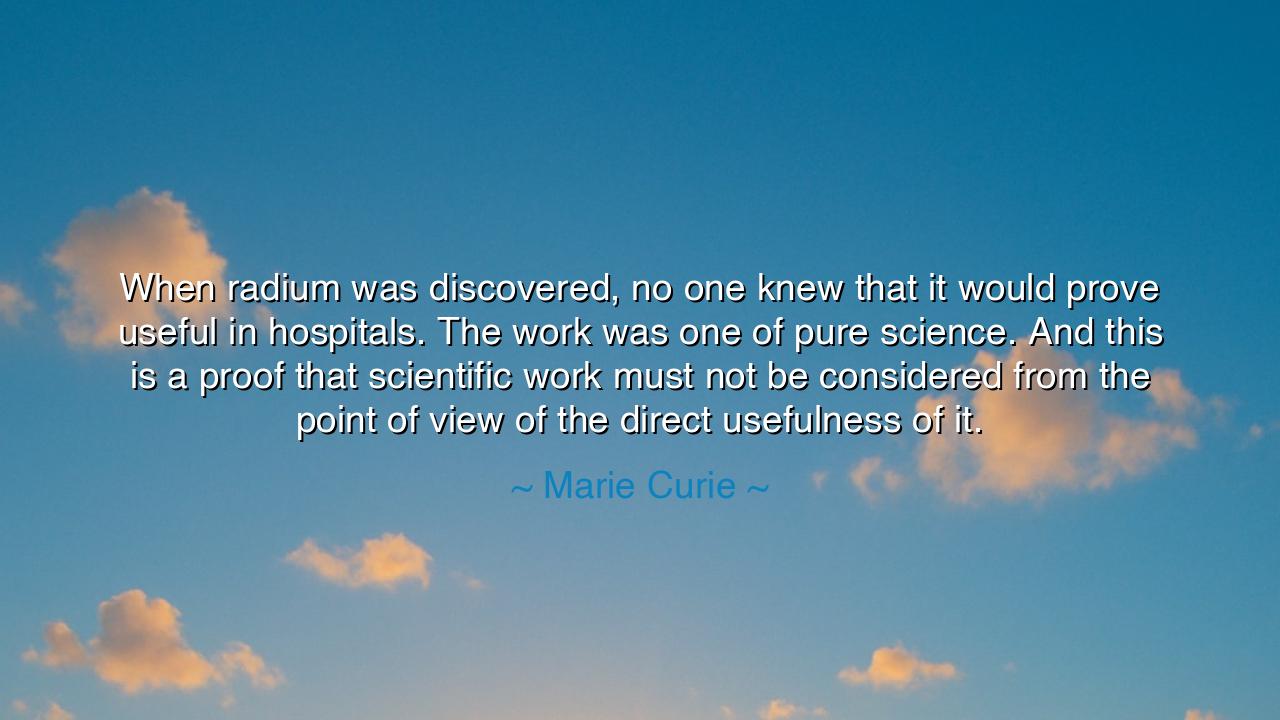
When radium was discovered, no one knew that it would prove
When radium was discovered, no one knew that it would prove useful in hospitals. The work was one of pure science. And this is a proof that scientific work must not be considered from the point of view of the direct usefulness of it.






Gather now, O children of wisdom, for there are words of profound truth spoken by the great Marie Curie, a woman whose legacy transcends time. She said: “When radium was discovered, no one knew that it would prove useful in hospitals. The work was one of pure science. And this is a proof that scientific work must not be considered from the point of view of the direct usefulness of it.” These words, though spoken in the early days of scientific discovery, still ring with timeless wisdom. They remind us that the pursuit of science is not always for immediate gain, but for a deeper understanding of the universe, one that may reveal its gifts only after much time has passed.
What, then, is the meaning of these words, O seekers of truth? Marie Curie, in her wisdom, reminds us that the value of science is not always apparent in the moment of discovery. Radium, that mysterious and powerful element, was first uncovered through pure scientific curiosity—not with the intention of curing diseases or saving lives, but simply to understand the forces of nature. At the time of its discovery, no one foresaw its later use in medicine—it was a pursuit driven by a desire to explore the unknown, to shed light on the mysteries of the atomic world. And yet, in time, radium would become one of the most important tools in treating cancer and many other ailments, a gift that emerged from the unpredictable nature of scientific exploration.
Consider the tale of Alexander Fleming, whose discovery of penicillin was equally born of chance and curiosity. Fleming did not set out to find an antibiotic, but through his observations in a messy laboratory, he stumbled upon a mold that killed bacteria. At the time, antibiotics were not even a concept in medical practice. And yet, from this serendipitous discovery, Fleming opened the door to a revolution in medicine that would save millions of lives. Science, in both Curie’s and Fleming’s cases, was pursued for the sake of knowledge, not for immediate, tangible outcomes. And it was through time and patience that the true value of their work became clear.
This story teaches us that science is not always bound by the expectation of direct usefulness. The greatest discoveries are often those that arise from pure curiosity, the drive to understand the universe, not simply to solve problems or provide answers. Marie Curie herself, in her tireless pursuit of understanding radioactivity, faced countless challenges. She worked without knowing what lay ahead, without any guarantee that her work would result in practical applications. And yet, it was precisely this selfless devotion to the unknown, this willingness to follow the path of discovery without concern for immediate rewards, that led to one of the most significant scientific breakthroughs of her time.
Let us not forget that science is often a long journey, one that requires faith in the process, and not just the end result. The discoveries that shape our world are not always those that we set out to make, but those that emerge from a commitment to knowledge. The work of the scientist is often like that of a gardener planting seeds in the earth, not knowing when or how they will bloom, but believing that through the work of tending and nurturing, something valuable will eventually emerge. The pursuit of science must be rooted in a love of learning, in the understanding that the benefits of discovery may not always be immediate, but may ripple out in ways we cannot yet comprehend.
The lesson, then, O children of the future, is this: Do not seek knowledge only for its immediate utility, but for the deeper understanding it brings. In our pursuit of science, we must be willing to embrace the unknown, to venture into realms where we do not yet understand the purpose or the outcome. Do not be discouraged by the lack of immediate rewards, for the seeds you plant today may bear fruit in ways that will transform the world tomorrow. Science, when approached with patience and passion, opens doors to endless possibilities, many of which are beyond our current comprehension.
So I say to you, O children of the future, take up the mantle of curiosity, as Marie Curie did. Follow the path of discovery, not for the promise of immediate answers, but for the joy of exploration itself. Seek knowledge not with a fixed goal in mind, but with a belief in the power of the journey, and know that through this pursuit, you will contribute to a future you cannot yet imagine. Science, in all its forms, is the key to unlocking the mysteries of the universe, and in your hands, it holds the power to shape a future filled with discovery, understanding, and unexpected wonders.






AAdministratorAdministrator
Welcome, honored guests. Please leave a comment, we will respond soon